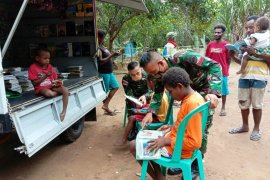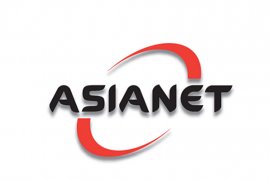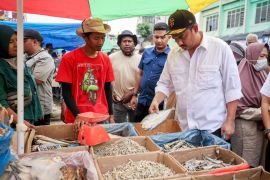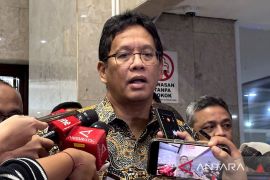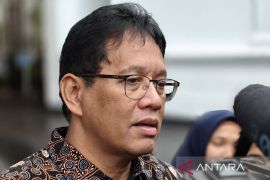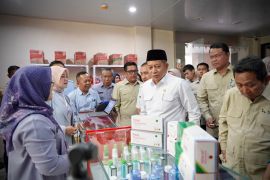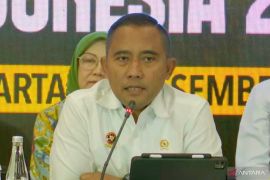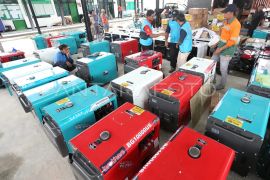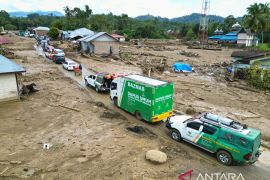Hasan said his activists encourage the people to stop using plastic bags. Instead, they are persuaded to start using butah or bakul (traditional bag made of straw weaving) or anything else that is not harmful for the earth.Banjarmasin, S Kalimantan (ANTARA News) - Greening is a movement in the hands of Forum Komunitas Hijaus (Green Community Forum/FKH) founders. They have followers coming from different places though their exact number is not recorded.
However, they have greened many places, and, believe it or not, this organization has no money, even a petty cash!
At one evening, midnight was just about two hours to come, and the FKH members were still wallowing in a pond in front of a childbirth hospital at Jalan Gatot Subroto, Banjarmasin, South Kalimantan Province. They were cleaning the pond before greening it with lotus.
Hours had passed. The FKH volunteers were still working. Their body got wet and dirty with mud. Amid their hard work, there was no food and snack prepared for them.
They neither got a cup of mineral water. Despite the absence of all these, everybody worked enthusiastically. They joked one another and got laughed as if they had no burden.
Although they were thirsty and hungry, they could finally finish cleaning the pond from weeds, rubbish, and much of mud. They kept doing their voluntary work until greening was done.
Hasan Zainuddin, one of the forums founders, said he was touched by the volunteers sincerity. His tears almost dropped to see their commitment.
At another night, the FKH volunteers went out of the city to Sultan Adam Public Forest Park, which is about 45 kilometers from Banjarmasin. What they did while it was dark over that lonely place? They took some seedlings for greening.
"Remember, what we are doing is an oxygen charity. A noble deed that will be long lasting to benefit the lives of people till our grand children and generations after," said Hasan to remind them. They listened and kept working.
In Banjarmasin, the FKH members attempt to green as many areas as possible amid the city administrations difficulty in providing its people with green spaces as required by the Spatial Planning Law, namely 30 percent of the citys land.
They plant shady trees, such as acacia, trembesi (Samanea saman), angsana (Pterocarpus indicus), some kinds of palm trees, and others at roadsides, riversides, around bridges, around football square, also at offices neighborhood.
In one morning at busy working hours, a group of the FKH volunteers were found alloting seedlings at a side of intersection road just at the entrance to University of Lambung Mangkurat campus. Several of them yelled, "Plant trees, plant trees."
Some of the passers-by stopped and circled around them to get seedlings. They also invited the people to join their greening movement or encouraged them to build their desire to plant, or offered them a help to have their own treasure of plants at their own yards. They attempt to motivate people to love planting.
How do the FKH volunteers spread this inspiring movement? FKH members do not just rely on their field activities but also frequently use social media, like facebook and youtube to encourage public to love greening.
They publish the eye-catching pictures or videos containing their happy moments of planting to attract the peoples attention in their existing social media platforms.
As a result, many people coming from different ages and social, cultural and economic backgrounds, including students and active and retired workers, are interested in joining their green campaigns. Everybody feels happy with greening.
The FKH volunteers do not want to work alone to promote the green movement. Instead, they go hand in hand with those from other environmental organizations or communities, like Saban (Banjarmasin old bike lovers), Sahabat Bekantan (focusing on helping and taking care of proboscis monkey), Melingai (caring for cleanliness and beauty of rivers).
The fact that the FKHs founders, like Hasan, Muhammad Ary, and Zany Talux are the activists of Saban while Melingai is the wing of this organization for cleaning up the rivers. The same activists also support Sahabat Bekantan.
In promoting their environmental movement, the FKH activists, for instance, launched a public awareness campaign and brought more than a thousand seedlings to many places, including mosques and schools, in Banua Anam (upstream area of six districts in South Kalimantan).
In Novermber 2014, the FKH held a Green Festival at Siring (river embankment) Piere Tendean, where a new floating market of Banjarmasin is located.
In the same year, the Directorate General of Urban Spatial of the Ministry of Public Works invited the FKH for participating in a Green City Development Program (P2KH) in Jakarta. In response to this invitation, the FKH sent its chairman Muhammad Yusuf and its secretary, Hasan Zainuddin, as participants.
The FKH, indeed, is a partner for the government not only in greening campaign but also in action. "We frequently educate the people about the importance of planting for life. We need plant trees for our oxygen.By planting the trees, we are not just doing for our own selves but for our grand children and next generations as well," Hasan said.
In encouraging and inspiring students to love greening, the FKH activists visit schools. According to Muhammad Ary, FKHs deputy chairman, the forums volunteers teach the students by showing them the good way of doing planting and giving them seeds to be planted.
By doing this, they want to send the message of "planting trees means promoting oxygen charity", a phrase that has become the tagline of FKH as written on "butah" (traditional backpack made of rattan) that the FKH volunteers always bring while doing the voluntary works.
Hasan said his activists encourage the people to stop using plastic bags. Instead, they are persuaded to start using butah or bakul (traditional bag made of straw weaving) or anything else that is not harmful for the earth.
In May 2016, a young FKH activist named Rizky Naufal made a boat like sampan from hundreds of mineral water bottles. "We make this work to save our environment," he said adding that he collected bottle waste from many places, especially hotels and restaurants.
Saving Indonesia from the overuse of plastic bags is very important because it is recorded as the world's second largest plactic waste producer after China. A study published in Science on February 13, 2015 revealed that Indonesia produced 187.2 million tons of plastic waste each year.
In dealing with this problem, the FKH members and sympathizers join a campaign for reducing the use of plastic bags in supermarkets and retailers, particularly when the municipal government of Banjarmasin supported this move.
As a result, the city then became an example of a success in prohibiting plastic bag from modern market in Indonesia. Other cities had even made Banjarmasin be their destination for doing comparative study.
However, how can these all good deeds done by the FKH volunteers amid the fact that this organization has no funds to run its routine activities? How do the people get thousands of tree seedlings for free from the FKH activists?
These all are possible because of the FKHs good cooperation with the government, public donation, and its activists own money for helping run the organizational activities.
Muhammad Ary said he has had a garden with various kinds of trees that are donated for the FKHs program. The trees are also donated by even ordinary people, like Mugeni and Arifin, two retired public servants, he said.
What the FKH volunteers have been doing may just be a small step but it has indeed reflected a community-based movement that is so valuable for saving Banjarmasin citys environment.
Hasan and many other FKH volunteers have a common dream of having their own homeland with a clean free air and absence of smog.(*)
Reporter: Mahdani/Imam Hanafi
Editor: Heru Purwanto
Copyright © ANTARA 2017
